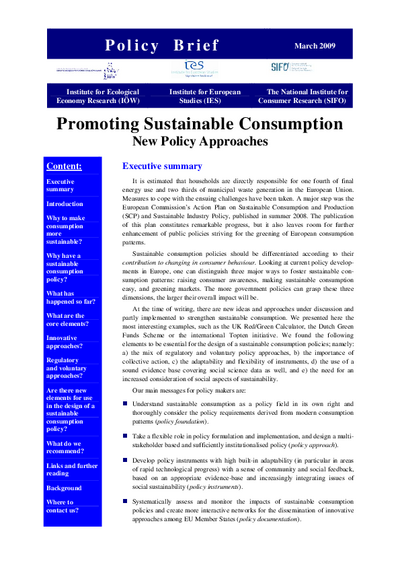Promoting Sustainable Consumption New Policy Approaches
It is estimated that households are directly responsible for one fourth of final energy use and two thirds of municipal waste generation in the European Union. Measures to cope with the ensuing challenges have been taken. A major step was the European Commission’s Action Plan on Sustainable Consumption and Production (SCP) and Sustainable Industry Policy, published in summer 2008. The publication of this plan constitutes remarkable progress, but it also leaves room for further enhancement of public policies striving for the greening of European consumption patterns. Sustainable consumption policies should be differentiated according to their contribution to changing in consumer behaviour. Looking at current policy developments in Europe, one can distinguish three major ways to foster sustainable consumption patterns: raising consumer awareness, making sustainable consumption easy, and greening markets. The more government policies can grasp these three dimensions, the larger their overall impact will be. At the time of writing, there are new ideas and approaches under discussion and partly implemented to strengthen sustainable consumption. We presented here the most interesting examples, such as the UK Red/Green Calculator, the Dutch Green Funds Scheme or the international Topten initiative. We found the following elements to be essential for the design of a sustainable consumption policies; namely: a) the mix of regulatory and voluntary policy approaches, b) the importance of collective action, c) the adaptability and flexibility of instruments, d) the use of a sound evidence base covering social science data as well, and e) the need for an increased consideration of social aspects of sustainability. Our main messages for policy makers are:
- Understand sustainable consumption as a policy field in its own right and thoroughly consider the policy requirements derived from modern consumption patterns (policy foundation).
- Take a flexible role in policy formulation and implementation, and design a multistakeholder based and sufficiently institutionalised policy (policy approach)..
- Develop policy instruments with high built-in adaptability (in particular in areas of rapid technological progress) with a sense of community and social feedback, based on an appropriate evidence-base and increasingly integrating issues of social sustainability (policy instruments)..
- Systematically assess and monitor the impacts of sustainable consumption policies and create more interactive networks for the dissemination of innovative approaches among EU Member States (policy documentation).



